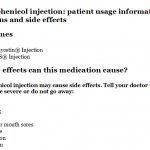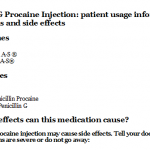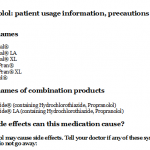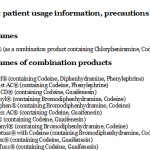
Codeine: patient usage information, precautions and side effects
Tuesday, May 30, 2017 by Gregory Van Dyke
http://www.naturalnewsreference.com/2017-05-30-codeine-patient-usage-information-precautions-and-side-effects.html
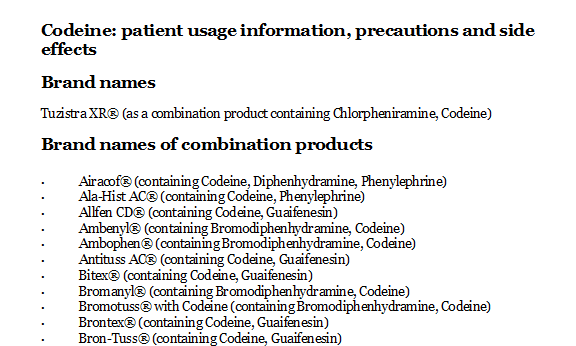
Codeine: patient usage information, precautions and side effects
Brand names
Tuzistra XR® (as a combination product containing Chlorpheniramine, Codeine)
Brand names of combination products
-
Airacof® (containing Codeine, Diphenhydramine, Phenylephrine)
-
Ala-Hist AC® (containing Codeine, Phenylephrine)
-
Allfen CD® (containing Codeine, Guaifenesin)
-
Ambenyl® (containing Bromodiphenhydramine, Codeine)
-
Ambophen® (containing Bromodiphenhydramine, Codeine)
-
Antituss AC® (containing Codeine, Guaifenesin)
-
Bitex® (containing Codeine, Guaifenesin)
-
Bromanyl® (containing Bromodiphenhydramine, Codeine)
-
Bromotuss® with Codeine (containing Bromodiphenhydramine, Codeine)
-
Brontex® (containing Codeine, Guaifenesin)
-
Bron-Tuss® (containing Codeine, Guaifenesin)
-
Brovex CB® (containing Brompheniramine, Codeine)
-
Brovex PBC® (containing Brompheniramine, Codeine, Phenylephrine)
-
Calcidrine® (containing Anhydrous Calcium Iodide, Codeine)
-
Cheracol® with Codeine (containing Codeine, Guaifenesin)
-
Cheratussin® (containing Codeine, Guaifenesin)
-
Codafen® (containing Codeine, Guaifenesin)
-
Codimal PH® (containing Codeine, Phenylephrine, Pyrilamine)
-
Cotab A® (containing Chlorpheniramine, Codeine)
-
Demi-Cof® (containing Chlorpheniramine, Codeine, Phenylephrine, Potassium Iodide)
-
Dex-Tuss® (containing Codeine, Guaifenesin)
-
Diabetic Tussin C® (containing Codeine, Guaifenesin)
-
Dicomal-PH® (containing Codeine, Phenylephrine, Pyrilamine)
-
Duraganidin NR® (containing Codeine, Guaifenesin)
-
EndaCof AC® (containing Brompheniramine, Codeine)
-
Endal CD® (containing Codeine, Diphenhydramine, Phenylephrine)
-
ExeClear-C® (containing Codeine, Guaifenesin)
-
Gani-Tuss NR® (containing Codeine, Guaifenesin)
-
Giltuss Ped-C® (containing Codeine, Guaifenesin, Phenylephrine)
-
Glydeine® (containing Codeine, Guaifenesin)
-
Guaifen AC® (containing Codeine, Guaifenesin)
-
Guiatuss AC® (containing Codeine, Guaifenesin)
-
Guiatussin® with Codeine (containing Codeine, Guaifenesin)
-
Halotussin AC® (containing Codeine, Guaifenesin)
-
Iophen® (containing Codeine, Guaifenesin)
-
Mar-cof CG® (containing Codeine, Guaifenesin)
-
Maxiphen CD® (containing Codeine, Guaifenesin, Phenylephrine)
-
M-Clear WC® (containing Codeine, Guaifenesin)
-
M-End PE® (containing Brompheniramine, Codeine, Phenylephrine)
-
Mytussin AC® (containing Codeine, Guaifenesin)
-
Nalex® AC (containing Brompheniramine, Codeine)
-
Notuss AC® (containing Chlorpheniramine, Codeine)
-
Notuss PE® (containing Codeine, Phenylephrine)
-
Pediacof® (containing Chlorpheniramine, Codeine, Phenylephrine, Potassium Iodide)
-
Pedituss® (containing Chlorpheniramine, Codeine, Phenylephrine, Potassium Iodide)
-
Pentazine VC® (containing Codeine, Phenylephrine, Promethazine)
-
Pentazine® with Codeine (containing Codeine, Promethazine)
-
Phenergan® VC with Codeine (containing Codeine, Phenylephrine, Promethazine)
-
Phenergan® with Codeine (containing Codeine, Promethazine)
-
Poly-Tussin AC® (containing Brompheniramine, Codeine, Phenylephrine)
-
Prometh® with Codeine (containing Codeine, Guaifenesin, Promethazine)
-
Robafen AC® (containing Codeine, Guaifenesin)
-
Robichem AC® (containing Codeine, Guaifenesin)
-
Robitussin® AC (containing Codeine, Guaifenesin)
-
Rolatuss® (containing Ammonium Chloride, Chlorpheniramine, Codeine, Phenylephrine)
-
Romilar AC® (containing Codeine, Guaifenesin)
-
Tusnel C® (containing Brompheniramine, Codeine, Guaifenesin)
-
Tussi Organidin® (containing Codeine, Guaifenesin)
-
Tussiden C® (containing Codeine, Guaifenesin)
-
Tussirex® (containing Caffeine, Codeine, Pheniramine, Phenylephrine, Salicylic Acid)
-
Tusso-C® (containing Codeine, Guaifenesin)
-
Vanacof® (containing Codeine, Dexchlorpheniramine, Phenylephrine)
-
Z Tuss AC® (containing Chlorpheniramine, Codeine)
-
Zodryl AC® (containing Chlorpheniramine, Codeine)
-
Zotex C® (containing Codeine, Phenylephrine, Pyrilamine)
What side effects can this medication cause?
Codeine may cause side effects. Tell your doctor if any of these symptoms are severe or do not go away:
-
lightheadedness
-
headache
-
drowsiness
-
mood changes
-
constipation
-
stomach pain
-
difficulty urinating
Some side effects can be serious. If you experience any of the following symptoms, stop taking codeine and call your doctor immediately or get emergency medical attention:
-
sleepiness
-
agitation, hallucinations (seeing things or hearing voices that do not exist), fever, sweating, confusion, fast heartbeat, shivering, severe muscle stiffness or twitching, loss of coordination, nausea, vomiting, or diarrhea
-
nausea, vomiting, loss of appetite, weakness, or dizziness
-
inability to get or keep an erection
-
irregular menstruation
-
decreased sexual desire
-
noisy or shallow breathing
-
difficulty breathing or swallowing
-
changes in heartbeat
-
rash
-
itching
-
hives
-
changes in vision
-
seizures
Codeine may cause other side effects. Call your doctor if you have any unusual problems while you are taking this medication.
If you experience a serious side effect, you or your doctor may send a report to the Food and Drug Administration’s (FDA) MedWatch Adverse Event Reporting program online (http://www.fda.gov/Safety/MedWatch) or by phone (1-800-332-1088).
IMPORTANT WARNING:
Some children who took codeine to relieve pain after surgery to remove their tonsils and/or adenoids have had slowed breathing and have died during their treatment. Many children who have surgery to remove their tonsils and adenoids are being treated for obstructive sleep apnea (condition in which the airway becomes blocked or narrow and breathing stops for short periods during sleep). This condition makes these children especially sensitive to breathing problems. Codeine should not be used to relieve pain in children after surgery to remove the tonsils and/or adenoids. If your child’s doctor prescribes codeine to relieve pain after this type of surgery, talk to your doctor about using a different medication to treat the pain.
Taking certain medications during your treatment with codeine may increase the risk that you will experience breathing problems or other serious, life threatening breathing problems, sedation, or coma. Tell your doctor if you are taking or plan to take any of the following medications: benzodiazepines such as alprazolam (Xanax), diazepam (Diastat, Valium), estazolam, flurazepam, lorazepam (Ativan), and triazolam (Halcion); medications for mental illness or nausea; other medications for pain; muscle relaxants; sedatives; sleeping pills; or tranquilizers. Your doctor may need to change the dosages of your medications and will monitor you carefully. If you take codeine with any of these medications and you develop any of the following symptoms, call your doctor immediately or seek emergency medical care: unusual dizziness, lightheadedness, extreme sleepiness, slowed or difficult breathing, or unresponsiveness. Be sure that your caregiver or family members know which symptoms may be serious so they can call the doctor or emergency medical care if you are unable to seek treatment on your own.
Drinking alcohol or using street drugs during your treatment with codeine also increases the risk that you will experience these serious, life-threatening side effects. Do not drink alcohol, take prescription or nonprescription medications that contain alcohol, or use street drugs during your treatment.
Your doctor or pharmacist will give you the manufacturer’s patient information sheet (Medication Guide) when you begin treatment with codeine and each time you refill your prescription. Read the information carefully and ask your doctor or pharmacist if you have any questions. You can also visit the Food and Drug Administration (FDA) website (http://www.fda.gov/Drugs/DrugSafety/ucm085729.htm) or the manufacturer’s website to obtain the Medication Guide.
Why is this medication prescribed?
Codeine is used to relieve mild to moderate pain. It is also used, usually in combination with other medications, to reduce coughing. Combination products that contain codeine and promethazine should not be used in children younger than 16 years of age. Codeine will help relieve symptoms but will not treat the cause of symptoms or speed recovery. Codeine belongs to a class of medications called opiate (narcotic) analgesics and to a class of medications called antitussives. When codeine is used to treat pain, it works by changing the way the brain and nervous system respond to pain. When codeine is used to reduce coughing, it works by decreasing the activity in the part of the brain that causes coughing.
Codeine is also available in combination with acetaminophen (Capital and Codeine, Tylenol with Codeine); aspirin; and carisoprodol; and as an ingredient in many cough and cold medications. This monograph only includes information about the use of codeine. If you are taking a codeine combination product, be sure to read information about all the ingredients in the product you are taking and ask your doctor or pharmacist for more information.
How should this medicine be used?
Codeine (alone or in combination with other medications) comes as a tablet, a capsule, and a solution (liquid) to take by mouth. It is usually taken every 4 to 6 hours as needed. Follow the directions on your prescription label carefully, and ask your doctor or pharmacist to explain any part you do not understand. Take codeine exactly as directed.
Codeine can be habit-forming. Do not take a larger dose, take it more often, or take it for a longer period of time than prescribed by your doctor. Do not stop taking codeine without talking to your doctor. Your doctor may decrease your dose gradually. If you suddenly stop taking codeine, you may experience withdrawal symptoms such as restlessness, widened pupils (black circles in the center of the eyes), teary eyes, irritability, anxiety, runny nose, difficulty falling asleep or staying asleep, yawning, sweating, fast breathing, fast heartbeat, chills, hair on your arms standing on end, nausea, loss of appetite, vomiting, diarrhea, stomach cramps, muscle aches, or backache.
If you are giving codeine to a child, give the medication only as needed. Do not give codeine on a regular (around-the-clock) schedule and do not give more than six doses in 24 hours.
Shake the solution well before each use to mix the medication evenly. Do not use a household spoon to measure your dose. Use the measuring cup or spoon that came with the medication or use a spoon that is made especially for measuring medication.
Other uses for this medicine
This medication is sometimes prescribed for other uses; ask your doctor or pharmacist for more information.
What special precautions should I follow?
Before taking codeine,
-
tell your doctor and pharmacist if you are allergic to codeine, any other medications, or any of the ingredients in the codeine product you plan to take. Ask your doctor or pharmacist for a list of the ingredients.
-
tell your doctor and pharmacist what prescription and nonprescription medications, vitamins, nutritional supplements, and herbal products you are taking or plan to take. Be sure to mention any of the following: cyclobenzaprine (Amrix); dextromethorphan (found in many cough medications; in Nuedexta); lithium (Lithobid); medications for cough, cold, or allergies; medications for anxiety or seizures; medications for migraine headaches such as almotriptan (Axert), eletriptan (Relpax), frovatriptan (Frova), naratriptan (Amerge), rizatriptan (Maxalt), sumatriptan (Imitrex, in Treximet), and zolmitriptan (Zomig); mirtazapine (Remeron); 5HT3serotonin blockers such as alosetron (Lotronex), dolasetron (Anzemet), granisetron (Kytril), ondansetron (Zofran, Zuplenz), or palonosetron (Aloxi); selective serotonin-reuptake inhibitors such as citalopram (Celexa), escitalopram (Lexapro), fluoxetine (Prozac, Sarafem, in Symbyax), fluvoxamine (Luvox), paroxetine (Brisdelle, Prozac, Pexeva), and sertraline (Zoloft); serotonin and norepinephrine reuptake inhibitors such as duloxetine (Cymbalta), desvenlafaxine (Khedezla, Pristiq), milnacipran (Savella), and venlafaxine (Effexor); trazodone (Oleptro); and tricyclic antidepressants (‘mood elevators’) such as amitriptyline, clomipramine (Anafranil), desipramine (Norpramin), doxepin (Silenor), imipramine (Tofranil), nortriptyline (Pamelor), protriptyline (Vivactil), and trimipramine (Surmontil). Also tell your doctor or pharmacist if you are taking or receiving the following monoamine oxidase (MAO) inhibitors or if you have stopped taking them within the past two weeks: isocarboxazid (Marplan), linezolid (Zyvox), methylene blue, phenelzine (Nardil), selegiline (Eldepryl, Emsam, Zelapar), or tranylcypromine (Parnate). Many other medications may also interact with codeine, so be sure to tell your doctor about all the medications you are taking, even those that do not appear on this list. Your doctor may need to change the doses of your medications or monitor you carefully for side effects.
-
tell your doctor what herbal products you are taking, especially St. John’s wort and tryptophan.
-
tell your doctor if you have slowed breathing, or have or have ever had asthma or paralytic ileus (condition in which digested food does not move through the intestines). Your doctor may tell you not to take codeine.
-
tell your doctor if you drink or have ever drunk large amounts of alcohol and if you have had recent abdominal or urinary tract surgery. Also tell your doctor if you have or have ever had a head injury; a brain tumor; any condition causing increased pressure in your brain; seizures; mental illness; lung disease such as asthma, chronic obstructive pulmonary disease (COPD, a group of diseases that cause gradual loss of lung function), obstructive sleep apnea, or other breathing problems; prostatic hypertrophy (enlargement of a male reproductive gland); urinary problems; low blood pressure; Addison’s disease (condition in which the body does not make enough of certain natural substances); allergies; or thyroid, pancreatic, intestinal, gallbladder, liver, or kidney disease.
-
tell your doctor if you are pregnant or plan to become pregnant. If you become pregnant while taking codeine, call your doctor.
-
you should know that this medication may decrease fertility in men and women. Talk to your doctor about the risks of taking codeine.
-
tell your doctor if you are breastfeeding. Some women who take codeine may have increased amounts of the medication in their breast milk, which can cause serious or life-threatening side effects in their breastfed babies. Call your doctor immediately or get emergency medical help if you become very sleepy and have difficulty caring for your baby. You should also call your baby’s doctor or get emergency help if your baby is sleepier than usual, has trouble breastfeeding or breathing, or becomes limp. If you breastfeed during your treatment and stop breastfeeding or stop taking codeine, your baby might experience withdrawal symptoms including irritability, being more active than usual, vomiting, problems sleeping, weight loss, high-pitched cry, fever, shaking, or diarrhea or more stools than usual. Call your baby’s doctor if your baby has any of these symptoms.
-
if you are having surgery, including dental surgery, tell the doctor or dentist that you are taking codeine.
-
you should know that this medication may make you drowsy. Do not drive a car or operate machinery until you know how this medication affects you. If you are giving codeine to a child, watch the child to be sure he or she does not get hurt while riding a bike or participating in other activities that could be dangerous.
-
you should know that codeine may cause dizziness, lightheadedness, and fainting when you get up too quickly from a lying position. This is more common when you first start taking codeine. To avoid this problem, get out of bed slowly, resting your feet on the floor for a few minutes before standing up.
-
you should know that codeine may cause constipation. Talk to your doctor about changing your diet and using other medications to treat or prevent constipation.
What special dietary instructions should I follow?
Unless your doctor tells you otherwise, continue your normal diet.
What should I do if I forget a dose?
Codeine is usually taken as needed. If your doctor has told you to take codeine regularly, take the missed dose as soon as you remember it. However, if it is almost time for the next dose, skip the missed dose and continue your regular dosing schedule. Do not take a double dose to make up for a missed one.
What should I know about storage and disposal of this medication?
Keep this medication in the container it came in, tightly closed, at room temperature, and away from excess heat and moisture (not in the bathroom). Keep it in a safe place where no one else can take it accidentally or on purpose. Be especially careful to keep codeine out of reach of children. If a child accidentally takes codeine, get emergency medical help right away.Dispose of any medication that is outdated or no longer needed. Talk to your pharmacist about the proper disposal of your medication.
In case of emergency/overdose
In case of overdose, call your local poison control center at 1-800-222-1222. If the victim has collapsed or is not breathing, call local emergency services at 911.
Symptoms of overdose may include the following:
-
difficulty breathing
-
excessive drowsiness
-
loss of consciousness
-
loss of muscle tone
-
cold and clammy skin
-
fainting
-
dizziness
-
slow heartbeat
What other information should I know?
Keep all appointments with your doctor and laboratory. Your doctor will order certain lab tests to check your body’s response to codeine.
Before having any laboratory test (especially those that involve methylene blue), tell your doctor and the laboratory personnel that you are taking codeine.
Do not let anyone else take your medication. Selling or giving away this medication may cause death or harm to others and is illegal. Your prescription might not be refillable. Ask your pharmacist any questions you have about refilling your prescription.
It is important for you to keep a written list of all of the prescription and nonprescription (over-the-counter) medicines you are taking, as well as any products such as vitamins, minerals, or other dietary supplements. You should bring this list with you each time you visit a doctor or if you are admitted to a hospital. It is also important information to carry with you in case of emergencies.
Why is this medication prescribed?
How should this medicine be used?
What special precautions should I follow?
What special dietary instructions should I follow?
What should I do if I forget a dose?
What side effects can this medication cause?
What should I know about storage and disposal of this medication?
What other information should I know?
Tagged Under: Tags: chemical medicine, medication, Pharma, Prescription Medicine

